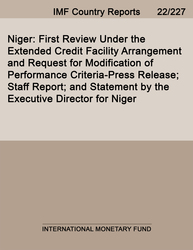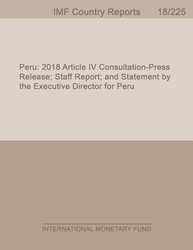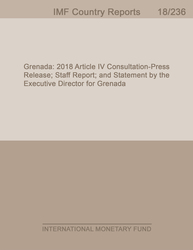
Niger: First Review Under the Extended Credit Facility Arrangement and Request for Modification of Performance Criteria-Press Release; Staff Report; and Statement by the Executive Director for Niger
Niger: First Review Under the Extended Credit Facility Arrangement and Request for Modification of Performance Criteria-Press Release; Staff Report; and Statement by the Executive Director for Niger
READ MORE...
Volume/Issue:
Volume 2022
Issue 227
Publication date: July 2022
ISBN: 9798400216138
$20.00
Add to Cart by clicking price of the language and format you'd like to purchase
Available Languages and Formats
| English | |||
| French |
Prices in red indicate formats that are not yet available but are forthcoming.
Topics covered in this book
This title contains information about the following subjects.
Click on a subject if you would like to see other titles with the same subjects.
Exports and Imports , Money and Monetary Policy , Public Finance , International - Economics , Environmental Economics , Agribusiness , reform agenda , state presence , Non-government investment , disbursement of SDR , government fund , Policy discussion , fertilizer price , IMF's transparency policy , Credit , West Africa , Europe , Global
Also of interest
Summary
This paper presents Niger’s First Review under the Extended Credit Facility Arrangement and Request for Modification of Performance Criteria. The unfolding acute food crisis and the deteriorating security situation in the Sahel region have increased fiscal pressures. The war in Ukraine is exacerbating these challenges. The near- and medium-term economic outlook for Niger is broadly favorable with growth projected to bounce back this year and accelerate thereafter with the start of oil exports through the new pipeline. A temporary deviation from fiscal targets over 2022–23 is therefore appropriate. Stepped-up efforts to improve domestic revenue mobilization and enhance spending quality will be key. A temporary deviation from fiscal targets over 2022–23 is warranted to accommodate urgent spending needs related to the food crisis and lower budget-support grants from donors. Rising financial sector vulnerabilities, including those related to deteriorating asset quality, particularly in the microfinance sector, will need to be carefully monitored. Further efforts to foster financial inclusion are also needed. Program performance has been broadly satisfactory with all quantitative performance criteria and indicative targets at end-December 2021 met. The implementation of the structural reform agenda is advancing well.
Copyright © 2010 - 2026
Powered by:
AIDC



